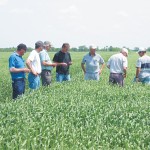Federal crop chemical regulators this summer will stop granting “conditional” registrations for new pesticides — a practice already largely on the way out, they note. Health Canada, which oversees the federal Pest Management Regulatory Agency (PMRA), said Tuesday it plans to stop granting new conditional registrations starting June 1, describing the move as an “important […] Read more

Feds scrap ‘conditional’ pesticide approvals
Packed agenda for agronomy update
Reading Time: < 1 minute More than two dozen speakers will be offering their insights at Agronomy Update in Red Deer on Jan. 19-20. Topics include aphanomyces, clubroot, fungicide timing, P and K decline, straight combining canola, insect control, and managing herbicide resistance. The conference kicks off with presentations on field crops pathology followed by soil management, grain marketing, and crops […] Read more
Get rid of unwanted meds and pesticides
Reading Time: < 1 minute Farmers and ranchers in southern Alberta will be able to dispose of unwanted or obsolete pesticide and livestock medications this fall. The Canadian Animal Health Institute and CleanFARMS will conduct the collection from Oct. 26-30 at 20 collection sites. A list of pickup sites will be posted at the CleanFARMS website later this summer. A similar […] Read more

Getting the good bugs on your side
Tweaking your pesticide applications and field management can boost the populations of beneficial bugs
Reading Time: 2 minutes Encouraging and protecting natural enemies can be an excellent way to control pest populations. “Everybody is familiar with ladybugs and lacewings as voracious, pest-consuming beneficial insects,” said Dustin Morton, commercial horticulture specialist with the Alberta Ag-Info Centre. “But fewer are familiar with how natural enemies such as hover flies, ground beetles, and even yellow-jacket wasps […] Read more

Ag groups launch bee initiative
Bees Matter is offering free seeds for pollinator-friendly gardens — and information on bees
Reading Time: < 1 minute A new program called Buzzing Gardens is offering Canadians free seeds to plant pollinator-friendly gardens. The program is an initiative of Bees Matter, a group consisting of chemical and agricultural groups including CropLife Canada, Bayer CropScience, Syngenta, the Canola Council of Canada, the Canadian Seed Trade Association, and the Canadian Honey Council. “The agricultural community […] Read more

Going ‘off label’ is a bad idea all around when it comes to pesticides
You can not only be fined, but also put your customers, the environment and your business at risk
Reading Time: 2 minutes The practice of ‘off-label’ spraying is not only illegal and can result in severe fines, but can also be very dangerous for your clients, your livelihood, and the environment, says a provincial commercial horticulture specialist. “Horticultural chemicals and pesticides often have the dubious distinction of being more expensive than their field crop cousins. In order […] Read more

U.S. EPA proposing temporary pesticide-free zones for honeybees
Reuters — U.S. environmental regulators on Thursday proposed a rule that would create temporary pesticide-free zones to protect commercial honeybees, which are critical to food production and have been dying off at alarming rates. The restrictions are aimed at protecting bees from “pesticides that are acutely toxic” to them, and would cover foliar applications when […] Read more

IPM: It’s all about combining pest management tools
The multi-pronged approach known as Integrated Pest Management can boost yields while reducing costs
Reading Time: 3 minutes While Integrated Pest Management (IPM) has become a catchphrase in agriculture today, there can be confusion as to what it actually is. “While the mechanics of the concept are discussed at workshops and lectures, many producers still don’t understand exactly what IPM is,” said Dustin Morton, a commercial horticulture specialist with the Alberta Ag-Info Centre […] Read more

Pesticides could lead to ‘pollination deficit,’ EU report says
Brussels | Reuters –– Evidence is mounting that widely-used pesticides harm moths, butterflies and birds as well as bees, adding to concerns crop production could be hit by a shortage of pollinators, according to a report drawn up for EU policymakers. The European Commission, the EU executive, placed restrictions on three neonicotinoid pesticides from Dec. […] Read more

More heat than light in neonicotinoid controversy
Reading Time: < 1 minute Neonics have become one of those issues that creates deep divides. Are neonicotinoid pesticides silently poisoning our world, with bees serving as the canaries in a toxic coal mine? Or is the whole thing just the latest cause célèbre promoted by radical environmentalists who have a hate on for “industrial” farming? The already rancorous debate […] Read more

